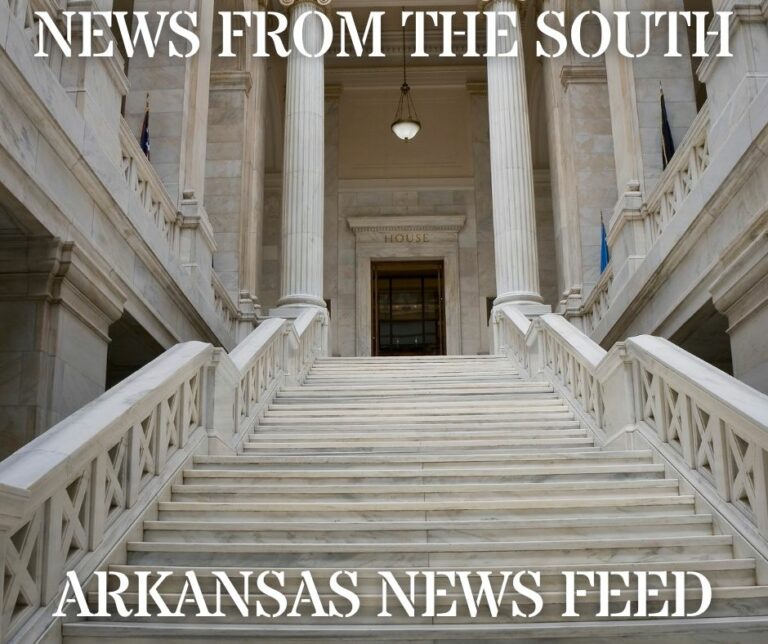News from the South - Kentucky News Feed
Treasury advises Congress must deal with debt limit before August or face default
by Jennifer Shutt, Kentucky Lantern
May 9, 2025
WASHINGTON — The Treasury Department announced Friday that Congress must address the debt limit before August, setting a firm deadline for Republicans to wrap up work on the “big, beautiful bill” that will raise the nation’s borrowing limit by up to $5 trillion.
Treasury Secretary Scott Bessent wrote in a letter to congressional leaders that “there is a reasonable probability that the federal government’s cash and extraordinary measures will be exhausted in August while Congress is scheduled to be in recess.
“Therefore, I respectfully urge Congress to increase or suspend the debt limit by mid-July, before its scheduled break, to protect the full faith and credit of the United States.”
The projection marks the first time the Trump administration has weighed in publicly on when the government will likely reach default since the last suspension expired in January.
In the months since then, the Treasury Department has used accounting maneuvers known as extraordinary measures to pay all of the country’s bills in full and on time.
Treasury’s projection is similar to a report the nonpartisan Congressional Budget Office released in March predicting the country would reach default in August or September unless Congress acted before then.
Reconciliation package
Republicans are hoping to lift the debt limit without having to negotiate a bipartisan agreement with Democrats, which is typically how lawmakers have addressed the debt limit during the past couple decades.
GOP leaders plan to raise the debt limit by between $4 trillion and $5 trillion in the 11-bill reconciliation package they’re using to address tax law, overhaul higher education aid and cut federal spending.
Speaker Mike Johnson, R-La., expects his chamber will vote on that legislation before the end of May, though Senate leaders haven’t put a timeline on when they’d bring the bill to the floor in that chamber.
GOP senators are likely to propose several amendments to the package, and any changes by the Senate would require the bill to get a final sign-off in the House before it could head to President Donald Trump’s desk.
The Treasury Department’s projection that a debt limit default will likely take place if no action is taken before August puts a firm deadline on when Republicans will need to reach final agreement.
Caution against waiting
Bessent also cautioned lawmakers against waiting until the last minute to get their work done.
“Prior episodes have shown that waiting until the last minute to suspend or increase the debt limit can have serious adverse consequences for financial markets, businesses, and the federal government, harm businesses and consumer confidence, and raise short-term borrowing costs for taxpayers,” he wrote. “A failure to suspend or increase the debt limit would wreak havoc on our financial system and diminish America’s security and global leadership position.”
A default on the country’s debt would limit the federal government to spending only the money it has on hand, likely leading to delayed, incomplete, or nonexistent payments on thousands of programs, including Social Security, Medicare, Medicaid, troop pay, veterans benefits and nutrition programs, among many others.
It would also lead to a downturn in the global economy with a recession being among the better scenarios.
A default is vastly different from a partial government shutdown and would lead to more significant consequences for federal spending and the economy.
Kentucky Lantern is part of States Newsroom, a nonprofit news network supported by grants and a coalition of donors as a 501c(3) public charity. Kentucky Lantern maintains editorial independence. Contact Editor Jamie Lucke for questions: info@kentuckylantern.com.
The post Treasury advises Congress must deal with debt limit before August or face default appeared first on kentuckylantern.com
Note: The following A.I. based commentary is not part of the original article, reproduced above, but is offered in the hopes that it will promote greater media literacy and critical thinking, by making any potential bias more visible to the reader –Staff Editor.
Political Bias Rating: Centrist
This article presents an objective and factual report about the Treasury Department’s warning regarding the U.S. debt limit, without an overt ideological perspective. It mainly reports on the Treasury’s communication to Congress, the timeline, and the consequences of not raising the debt limit in time. The article mentions various political figures, such as Republicans pushing for a reconciliation package and the involvement of Speaker Mike Johnson, but does not provide a biased slant on their actions or decisions. The focus remains on the Treasury’s projections and the factual consequences of a potential default, maintaining neutrality throughout.
News from the South - Kentucky News Feed
Budget Committee will vote to change industrial bond program
SUMMARY: On August 19th, the Budget, Finance, and Economic Development Committee will vote on changes to Lexington’s Industrial Revenue Bond (IRB) program. Proposed amendments include setting affordable housing requirements for projects with housing under Leaseback IRBs: 15-year terms require affordability for households at or below 80% of Area Median Income (AMI), and 10-year terms for those earning 80.1%-100% AMI. Additionally, the IRB program’s geographic scope will expand to support projects across the entire Urban Service Area, beyond the current limited zone. IRBs provide loans for developments that promote economic growth and job creation in Lexington.
The post Budget Committee will vote to change industrial bond program appeared first on lexingtonky.news
News from the South - Kentucky News Feed
WLKY interview on bullying prevention
SUMMARY: Carolyn Towns, a bullying prevention advocate and two-time author, shares her journey inspired by personal experiences of being bullied and her son’s bullying. Her children’s book, “Tiny But Mighty,” promotes using thinking skills over physical responses, while “Are You Raising a Bully?” guides parents, educators, and policymakers on preventing bullying and supporting both targets and bullies. Carolyn emphasizes early intervention, encouraging children to speak up as “Communication Commanders.” She advocates for federal laws mandating effective school bullying programs. Additionally, she developed the Bullying Buddy app, which alerts parents in real-time about bullying incidents. Carolyn conducts nationwide workshops empowering children to use their voices.
WLKY interview on bullying prevention
Subscribe to WLKY on YouTube now for more: http://bit.ly/1e5KyMO
Get more Louisville news: http://www.wlky.com
Like us: http://www.facebook.com/wlkynews
Follow us: http://twitter.com/WLKY
Instagram: https://www.instagram.com/wlky/
News from the South - Kentucky News Feed
AmeriCorps is under siege. What happens in the communities it serves?
by Ashley Murray, Kentucky Lantern
August 17, 2025
SILVER SPRING, Md. — Daniel Zare worked one-on-one as an AmeriCorps member with students going through rough times in school, lightening teachers’ workload in the classroom.
At AmeriCorps Project CHANGE, based in Silver Spring’s Sligo Middle School, Zare was one of several in his group who tracked adolescents’ emotional and social wellbeing over months using a system dubbed “My Score.” They then helped support the kids who were struggling the most.
In April, though, the program screeched to a halt. That’s when the Trump administration abruptly canceled nearly $400 million in active AmeriCorps grants across the United States that fund volunteers who embed in communities, in exchange for a small stipend and education award.
“All the work that we had culminating toward the end of the year, the relationships that we built with teachers and students and officials, it just completely went kaput because we were told we weren’t allowed to go to work at all,” Zare, 27, told States Newsroom.
Like so many longstanding federal programs and institutions severely reduced or dismantled as part of President Donald Trump and billionaire Elon Musk’s Department of Government Efficiency project, AmeriCorps — and its nonprofit partners — are now assessing the damage and seeking a way forward.
AmeriCorps programs that survived last spring’s DOGE cuts are slowly beginning a new year of service amid major uncertainty over whether they will be able to continue their work in classrooms, food banks, senior centers and other community hubs.
Winners and losers among states
AmeriCorps, a federal agency signed into law in 1993 by former President Bill Clinton, places roughly 200,000 members across the United States at 35,000 service locations, according to current agency data.
Members serve in schools, local governments and with a wide range of nonprofits that focus on health, disaster relief, environmental stewardship, workforce development and veterans.
The staffers, who pledge to “get things done for America,” are paid a modest living allowance that hovers around the poverty line. Some, but not all, can get health insurance while in the program.
Members who complete their service term, which usually lasts from 10 to 12 months, receive an education award that can be used to pursue a degree, earn a trade certificate or pay student loans.
AmeriCorps federal dollars reach programs via a couple routes. In many cases, grants flow from AmeriCorps to governor-led state and territorial commissions that divvy them up according to local priorities. In other cases, federal dollars flow straight to a program via a competitive grant process.
Kaira Esgate, CEO of America’s Service Commissions, said when the Trump administration ordered the cuts in April, some states lost large portions of their AmeriCorps portfolio, while other states fared better.
“There were no real clear trend lines around what or who got terminated and why,” said Esgate, whose member organization represents all 49 state commissions (South Dakota doesn’t have one) and the commissions for the District of Columbia, Guam and Puerto Rico.
Abby Andre, executive director of The Impact Project, a new nonprofit tracking government cuts, has been collecting data and plotting on an interactive map where AmeriCorps programs have been canceled. Andre, a former Department of Justice litigator, has also worked with her team to build other maps showing where federal workforce cuts have been felt across the country.
“AmeriCorps is a really great example of the federal dollars being kind of invisible in communities. Communities often don’t know that a local food bank or a senior center are supported by AmeriCorps volunteers and AmeriCorps money,” said Andre, who taught administrative law at the Vermont Law School after working under President Barack Obama and in Trump’s first administration.
Andre said communities with a lack of social services, including in rural areas, will likely feel the biggest losses without an AmeriCorps presence because the agency “facilitates pennies-on-the-dollar type services through volunteer work.”
“It’s not as though if these community services folded, those communities would have the money to fund equal or better services through the private market,” she said.
Losing trust
The Maryland Governor’s Office on Service and Volunteerism gave the green light to Project CHANGE to keep its program, which serves Montgomery County in suburban Washington, D.C., running through the upcoming school year.
Paul Costello, director of Project CHANGE, is now scrambling to launch a new AmeriCorps cohort after receiving the news on July 22 that the initiative had been funded. He estimates members won’t be able to begin until almost a month into the school year.
Paul Costello, director of Project CHANGE at Sligo Middle School in Silver Spring, Maryland, reads student self-assessments of their confidence levels, hopefulness and excitement for learning. Costello’s program places AmeriCorps members in classrooms to help students with emotional and social challenges. (Photo by Ashley Murray/States Newsroom)
“Sadly, AmeriCorps, as a brand name, is badly damaged, I think. I mean, I’ve got a meeting on Wednesday with a major partner who told us two weeks ago ‘We thought you were dead,’” Costello told States Newsroom in an Aug. 11 interview.
Costello’s program not only places service members in Montgomery County Public Schools, where Zare served, but also with partners including Community Bridges, Montgomery Housing Partnership and Family Learning Solutions.
The nonprofits respectively focus on helping adolescent girls from diverse backgrounds, children whose families live in community-developed affordable housing units and teens eyeing college and career paths.
The county’s school system is the largest in the state and serves a highly diverse population. About 44% of the system’s 160,000 students qualify for free and reduced meals, and close to 20% are learning English while continuing to speak another language at home.
Costello’s 18 cohort members embedded in those schools and nonprofits this past academic year were suddenly yanked in April when the government cut his grant. The partners, which had planned and budgeted to have the members through June, were thrown into “total chaos,” Costello said.
“So some of them are so desperate, they rely on their members. They had to dig into their pockets to keep them on as staff. And then we go back to them this year and say, ‘You want members this year?’ AmeriCorps has made no attempt to make them whole. So they’ve been screwed,” Costello said.
AmeriCorps did not respond to States Newsroom’s questions about nonprofits losing money.
Legal action
The federal courts granted some relief to members and organizations who abruptly lost living allowances and contractually obligated funding.
A Maryland federal district judge ordered in June that funding and positions be restored in 24 Democratic-led states and the District of Columbia that sued the agency.
Another district judge in the state also handed a win to more than a dozen nonprofits from across the country that sued to recover funding they were owed.
But for many it was too late, and AmeriCorps’ future still feels shaky.
After suddenly losing his living allowance in April, Zare had to leave Silver Spring.
“I was renting a room off of Georgia (Avenue), and I was not able to pay rent there anymore, so I actually moved back to my mom’s in Germantown for the time being,” he told States Newsroom in August, referring to another Maryland suburb.
Hillary Kane, director of the Philadelphia Higher Education Network for Neighborhood Development, said by the time the court orders were issued, many of her AmeriCorps members had already found other positions and she had completely let go of one of her full-time staffers.
While the court injunctions were “welcome news,” reinstating the programs remained “questionable,” Kane wrote in a July 21 update for Nonprofit Quarterly.
Kane’s organization is a member of the National College Attainment Network, a Washington, D.C.-based nonprofit that was among the successful plaintiffs.
Other organizations that joined the lawsuit are based in California, Iowa, Maine, Maryland, Minnesota, New Jersey, New York, North Carolina, Pennsylvania, South Dakota and Virginia.
The Democratic-led states that won reinstatement for AmeriCorps members include Arizona, California, Colorado, Connecticut, Delaware, Hawaii, Illinois, Kentucky, Maine, Massachusetts, Michigan, Minnesota, Nevada, New Jersey, New Mexico, New York, North Carolina, Oregon, Pennsylvania, Rhode Island, Vermont, Washington, and Wisconsin.
Going forward?
Kane got news on July 10 that PennSERVE, Pennsylvania’s state service commission, reinstated funding for her AmeriCorps program that places members in four West Philadelphia high schools to mentor students on their post-graduation plans.
The late notice meant Kane could only begin recruiting new members in mid-July.
“And so our start date has to be a bit fluid,” Kane told States Newsroom during a July 22 interview. “We have to essentially recruit people into this one-year cohort position, and say, ‘We’re hoping to start September 2, but we’re not 100% sure. Can you kind of just roll with it?’ It’s an awkward position to have to be in.”
The AmeriCorps pledge hangs at Project CHANGE at Sligo Middle School in Silver Spring, Maryland, on Monday, Aug. 11, 2025. (Photo by Ashley Murray/States Newsroom)
Other AmeriCorps programs have not fared so well, as the Trump administration’s Office of Management and Budget continues to withhold funds that were appropriated by Congress for the ongoing fiscal year.
Trump signed legislation in March that extended the $1.26 billion for AmeriCorps for the full 2025 fiscal year, which ends on Sept. 30.
Kane said the most “insidious” part of the recent AmeriCorps storyline is that programs that receive grants directly from the federal agency are being strung along by OMB.
“So there are agencies who have been theoretically awarded money, but they’re like, ‘Is it actually going to happen? Should I spend all this money and then not be able to bill the federal government to reimburse me if OMB is going to hold it hostage?’”
Programs at risk include 130 recently expired contracts for AmeriCorps Foster Grandparent and Senior Companions programs that support roughly 6,000 senior citizen volunteers across 35 states. The programs are eligible for just over $50 million for the new service year, which should be off to a start.
Congress pleads with budget office
A bipartisan group of U.S. senators pressed the executive branch agency on Aug. 1 to release the funds.
“Further delays in grantmaking will have immediate and irreversible consequences for programs, AmeriCorps members, and communities,” the senators wrote in a letter to OMB Director Russ Vought.
Republican Sens. Bill Cassidy of Louisiana, Susan Collins of Maine, Lisa Murkowski of Alaska and Thom Tillis of North Carolina joined Democratic Sens. Chris Coons of Delaware, Jack Reed and Sheldon Whitehouse of Rhode Island, and Senate Minority Leader Chuck Schumer of New York in signing the letter. All are members of the Senate National Service Caucus.
The White House and AmeriCorps did not respond for comment.
The Republican-led Senate Committee on Appropriations voted on July 31 to preserve $1.25 billion in AmeriCorps funding for fiscal year 2026. Collins chairs the committee.
U.S. House appropriators, which for the last two years under Republican leadership have sought to cut AmeriCorps funding, are expected to debate its budget in September. But it’s almost certain Congress will have to pass a stopgap spending bill when the end of the fiscal year arrives to stave off a partial government shutdown, so a final decision on funding may not come for months.
Change for everyone
Zare never did have a chance to say goodbye to all his students in April.
And even though the option was on the table, he did not sign up to serve a third year with AmeriCorps.
Before he applied and earned a spot with Project CHANGE, Zare was working odd jobs, including as a utilities contractor for Comcast. He had also earned his associate’s degree.
Former AmeriCorps service member Daniel Zare, 27, visits Project CHANGE at Sligo Middle School on Monday, Aug. 11, 2025 in Silver Spring, Maryland, where he mentored students before federal government cuts in April. (Photo by Ashley Murray/States Newsroom)
“I don’t think there’s any other program to take someone like me who was working a couple of different jobs and put them in an environment like this, to see firsthand as an American citizen how our classrooms operate and what position I would need to be in to actually be of benefit,” Zare told States Newsroom.
Zare is now freelancing and debating his next move, whether that’s a new job or further higher education.
“AmeriCorps is something that I’m always going to cherish because a lot of the people there still help me,” he said.
Editor’s note: D.C. Bureau Senior Reporter Ashley Murray served in AmeriCorps in 2009-2010.
Kentucky Lantern is part of States Newsroom, a nonprofit news network supported by grants and a coalition of donors as a 501c(3) public charity. Kentucky Lantern maintains editorial independence. Contact Editor Jamie Lucke for questions: info@kentuckylantern.com.
The post AmeriCorps is under siege. What happens in the communities it serves? appeared first on kentuckylantern.com
Note: The following A.I. based commentary is not part of the original article, reproduced above, but is offered in the hopes that it will promote greater media literacy and critical thinking, by making any potential bias more visible to the reader –Staff Editor.
Political Bias Rating: Center-Left
This content presents a generally sympathetic view toward AmeriCorps and highlights the negative impacts of funding cuts implemented during the Trump administration. It emphasizes the disruption caused by these cuts to community programs and vulnerable populations, and it includes critical perspectives on the administration’s actions. The article also references bipartisan efforts to restore funding, but the overall tone and focus on social service programs and government support align with a center-left perspective that values public investment in social welfare and community services.
-
News from the South - Tennessee News Feed3 days ago
GRAPHIC VIDEO WARNING: Man shot several times at point-blank range outside Memphis convenience store
-
News from the South - Texas News Feed2 days ago
Kratom poisoning calls climb in Texas
-
News from the South - Kentucky News Feed3 days ago
Unsealed warrant reveals IRS claims of millions in unreported sales at Central Kentucky restaurants
-
Local News7 days ago
Bay St. Louis artist commemorates Amtrak’s return with hundreds of handmade medallions
-
News from the South - Arkansas News Feed5 days ago
Idaho is losing OB-GYNs. Doctors who remain are trying to shoulder the extra burdens.
-
News from the South - Georgia News Feed6 days ago
RCSS: Students showed growth on Georgia Milestones Assessments for 2024-2025
-
Our Mississippi Home5 days ago
Pride of Mississippi Marching Band to Kick Off Season with Free Concert
-
News from the South - Florida News Feed6 days ago
Summer heat, storms continue to swamp Central Florida. Here’s what to expect













































